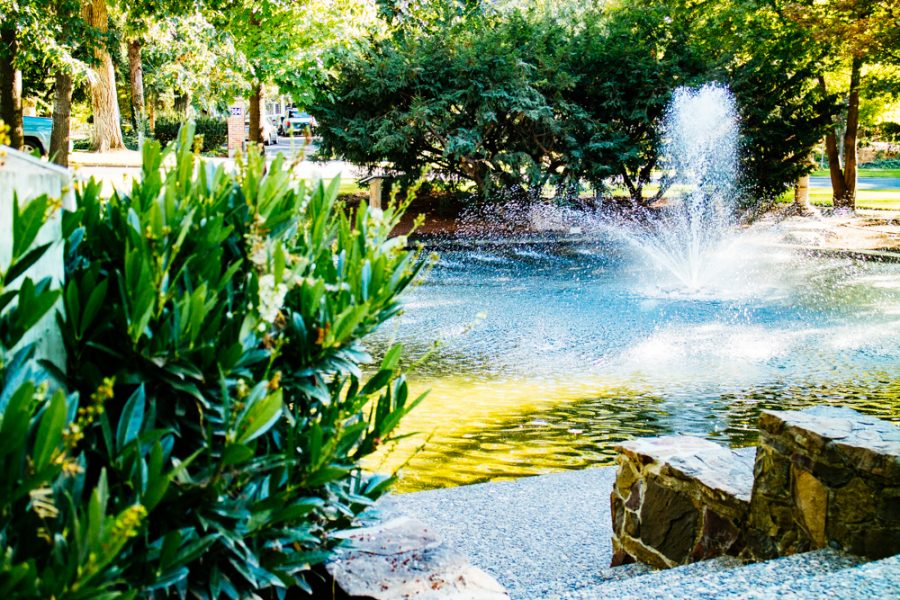Lakum Duckum gets a new fountain
The recently-installed fountain in Lakum Duckum may benefit ducks and students alike.
September 22, 2016
The new fountain in Lakum Duckum may have a bigger impact on Whitman students than one may think. Apart from being visually pleasing, it also has ecological, aesthetic and health benefits. These include controlling the growth of algae and providing students with a relaxing atmosphere.
The fountain was installed in the middle of August. Whitman College Landscape Supervisor Bob Biles directed the project.
“As the fountain percolates up and hits the water, it’s actually introducing oxygen into the water,” Biles said when asked why the fountain was installed. “The increased oxygen in the water helps with the phosphates that are created by the organic matter and the duck feces.”
In other words, the oxygen helps to decay pond waste and algae, improving the overall water quality.
There were also several secondary reasons for installing the fountain. “It’s aesthetically pleasing,” Biles noted. As the fountain spray hits the water, patterns are created in the pond. Many students appear to enjoy this feature.
“It’s pretty, and also relaxing,” first-year Vanessa Gomez said. “I think it adds character to campus.”
Junior Anna Middleton felt “neutral” about the fountain but didn’t mind it. “It seems nice,” she said. “I didn’t even realize it was new. I came down the other day and I saw it and I was like, ‘I don’t think that was there before.’ It makes [the pond] a little more exciting.”
Health benefits were also taken into account during the decision to install the new fountain.

“Research has found that the sound of moving water helps to relieve people who have depression,” Biles said. “Some of the research has indicated that the reason why the depression is lessened is because of increased serotonin levels in your brain that the sound of water stimulates.”
Biles pointed out another interesting fact about the fountain when he said, “[The fountain] creates white noise and helps to blot out a lot of the mechanical distractions that go around us in our daily lives. Before, you could hear the lawnmowers out there. You could hear the traffic driving by when you’re up above.”
However, once one walks down the stone steps to the bench beside the pond, these noises are muffled and almost blocked out as the more natural sound of water from the fountain takes over. This removal from the world of constant mechanical noise may be a way students can find another peaceful moment in their busy lives.
Interestingly, the fountain is actually floating on the surface of the water. Mr. Biles mentioned that a different fountain had previously been installed around 20 years ago, but it was constantly plugged up because it worked by sucking water and inevitably, debris off the bottom of the pond. This new fountain has a floating pump and is anchored to cement blocks on the floor of the pond, thereby preventing a recurrence of that problem.
It seems as if the fountain is, all in all, a beneficial addition to campus. When the leaves start to fall this autumn, the fountain may have to be turned off because of the clogging that could occur. However, students can enjoy sitting by the fountain now to find a source of relaxation and relief from classes and other stressful matters.







Kaylub • Nov 11, 2020 at 8:35 pm
wow great article!